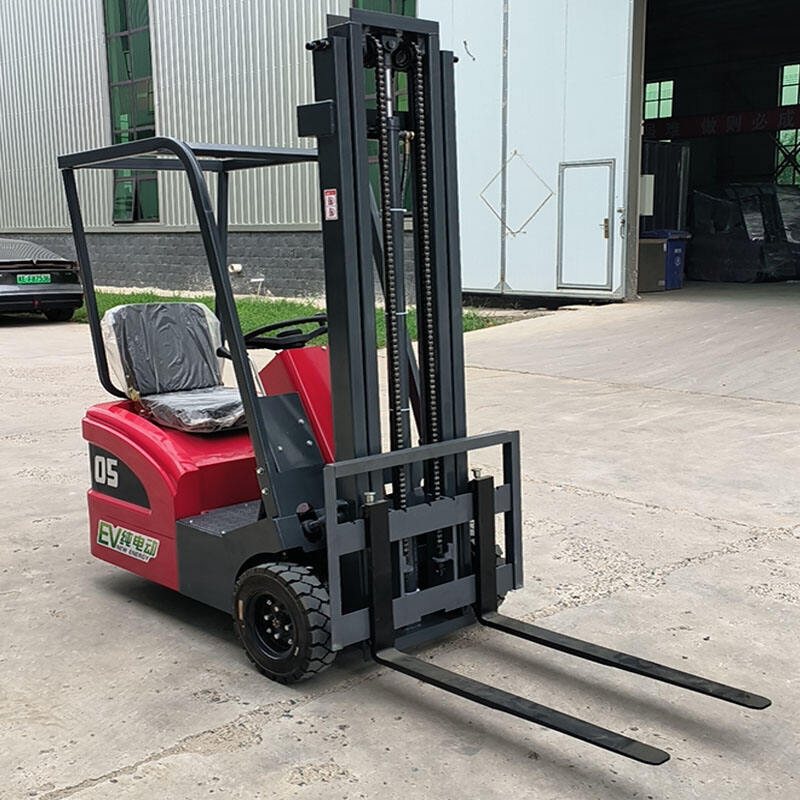The Advantages of Using an Electric Forklift in Warehouses
Cost Efficiency in Warehouse Operations
Reduced Fuel and Maintenance Expenses
Switching to electric forklifts saves money on fuel costs right away. Traditional gas or diesel models need constant refueling, while electric versions just plug in at night. Electricity prices tend to stay pretty steady too, so there's no wild price swings like with fossil fuels. No fuel means big savings over time. Plus electric forklifts don't have all those complicated parts that break down so often. Fewer parts means less time spent fixing things and getting back to work faster. Companies switching from gas to electric typically see around $6k to $14k saved each year according to research from ITA among others. When looking at both lower fuel bills and repair costs together, it's easy to see why warehouses across the country are making the switch to electric models for better bottom line performance.
Long-Term ROI Compared to Gas Models
Electric forklifts tend to deliver better returns over the long haul than their gas counterparts. Sure, they might cost more upfront, but companies save money on operations and often qualify for tax breaks too, according to Equipment Depot research. Many businesses that switched to electric models report real financial gains within just a few years, largely because of reduced running costs. When calculating ROI, look at the big picture including fuel expenses, maintenance bills, and even environmental factors. Electric forklifts generally last longer than traditional ones, plus there are various government programs offering tax credits and grants that make the switch even more attractive financially. Companies that take all these factors into account find themselves standing out in today's competitive warehousing market.
Environmental Benefits for Sustainable Warehousing
Zero Emissions in Confined Spaces
Electric forklifts bring major environmental benefits since they produce no emissions at all, which matters a lot in tight warehouse settings where air quality counts. Cleaner air means healthier workers who aren't breathing in the toxic fumes from gas powered models anymore. Warehouse managers know this well because OSHA and other safety groups require proper ventilation anyway. Switching to electric makes it much easier to hit those standards, so companies across the country are making the change. The money saved on medical claims when employees stay healthier is another bonus nobody talks about enough. Small electric forklifts are becoming increasingly popular too, not just because they don't pollute but also because they fit better in narrow aisles and cut down on maintenance costs over time.
Meeting Modern Warehouse Sustainability Goals
Getting warehouse operations in line with green goals matters more than ever as companies work on expanding their CSR initiatives across the board. Electric forklifts have become essential tools in making warehouses greener because they cut down on pollution and generally use less power compared to traditional models. Looking at what's happening in the industry right now, there's definitely a move towards cleaner warehouse practices, and electric forklifts sit right at the heart of this change. Warehouses switching to these electric machines see real benefits beyond just cutting emissions. They actually get closer to meeting those green standards and earning eco-friendly labels that matter so much today. Take LEED certification or ISO 14001 for example – having electric forklifts running around makes it easier to qualify for these kinds of credentials. As more facilities adopt these greener alternatives, we're seeing how practical benefits meet environmental ones head on in today's warehouses.
Enhanced Maneuverability in Narrow Aisles
Three-Wheel Electric Forklift Design Advantages
Three wheel electric forklifts have amazing turning capabilities, especially useful in those tight spots found throughout most warehouses today. They make sharper corners than regular forklifts, so they can get around in really cramped areas without much trouble. The ability to turn on a dime makes all the difference when trying to squeeze every last inch out of storage facilities where floor space costs money. Electric versions need much narrower aisles compared to older models, sometimes cutting down aisle width by several inches across the board. Many warehouse supervisors actually prefer these newer models because they let workers pack items closer together while still being able to reach everything needed. Some folks report that this kind of forklift helps them fit about 10% more inventory into the same footprint as before without making things impossible to access.
Precision Handling for High-Density Storage
Electric forklifts bring a whole new level of accuracy to material handling, something that matters a lot in tight storage situations where even small errors can slow things down and lead to damaged inventory. Modern models come equipped with smart steering mechanisms and automatic load balancing features that make sure items get placed just right every time. Warehouse managers notice this makes a big difference when trying to maximize space utilization since products aren't taking up extra room due to misplacement issues. Industry reports indicate that facilities switching to electric lift trucks see around 30% fewer damaged goods simply because these machines keep loads stable throughout the entire movement process. This kind of reliability becomes absolutely essential in operations dealing with thousands of units daily where even minor improvements translate into significant cost savings over time.
Top Electric Forklift Models for Warehouse Use
0.5T Three Wheels Forklift: Compact Powerhouse
The 0.5T Three Wheel Forklift stands out as a compact electric lift truck built specifically for tight warehouse conditions. What makes this model special? It features a three pivot point system that really boosts how well it can turn around in those tricky spots. Warehouse managers love seeing these machines zip through narrow storage areas and crowded loading docks without getting stuck. The small footprint becomes a big plus in city distribution centers where floor space comes at a premium cost. Logistics professionals across the country are increasingly turning to this type of equipment because it simply works better in confined spaces while still handling standard loads efficiently. Many warehouses report noticeable improvements in workflow after adding these units to their fleet.

CPD20 2Ton Customized Electric Forklift Trucks
Warehouse managers love the CPD20 2 Ton Customized Electric Forklift because it comes with so many ways to tailor it to different storage environments. What sets this electric lift apart is how stable it stays even when lifting heavy loads thanks to its solid build and lower center of gravity design. Many warehouses in manufacturing and logistics rely on these machines daily since they handle tough jobs without breaking down. People who work with materials ranging from automotive parts to construction supplies find that the CPD20 adapts well to their specific requirements. One distributor reported saving time and money after switching to these lifts, while another warehouse manager mentioned how much easier inventory management became once they started using them regularly.
0.5ton Three Wheel Forklift: Agile Material Handler
The 0.5 ton three wheel forklift really shines as a nimble option for moving stuff around busy warehouses. With a load capacity of half a ton and powered by a decent lifting motor, this machine handles light goods exceptionally well even when space gets cramped. What makes it so useful is how easily it can weave through those narrow storage aisles without getting stuck, which warehouse managers love because it keeps operations running smoothly. Real world tests at several facilities have shown these machines actually cut down on wasted time and improve overall workflow in places where every inch counts. For anyone trying to get the most out of limited warehouse floor space, this electric pallet jack forklift has become something of a game changer over recent years.

These models showcase cutting-edge technology and innovation in the realm of electric forklifts, catering to the diverse needs of modern warehouse and logistics operations.
Technological Features for Modern Warehouses
IoT-Enabled Performance Monitoring
Adding Internet of Things technology to electric forklifts has completely changed how we monitor performance and manage fleets. With these smart devices installed, managers can track all sorts of important info in real time - things like how long each machine runs, what loads they carry, and even battery condition. All this constant data gathering makes it possible to predict when maintenance will be needed before problems actually happen. Warehouse operators tell us that getting those early warning signs about potential issues really cuts down on downtime and keeps their machines running longer. Take a look at distribution centers that have adopted these IoT systems: they notice fewer breakdowns during peak seasons because technicians get alerted about minor problems before they become major headaches. The bottom line? Smart forklifts don't just work better day to day, they prevent those frustrating surprise breakdowns that disrupt everything in busy warehouses where every minute counts.
Automated Safety Systems for Busy Environments
Electric forklifts today come loaded with smart safety tech that really makes a difference in busy warehouses where things get hectic fast. Most models now have sensors that spot obstacles, warning lights for operators, plus automatic brakes that kick in when needed to stop accidents before they happen. Warehouses that actually put these systems to work report around 40% fewer accidents according to industry reports, which speaks volumes about how good these improvements really are. Take a look at any facility that's installed these safety features and they'll tell stories about collisions dropping off a cliff basically. The technology keeps getting better all the time too, so companies don't have to sacrifice speed or productivity just to keep workers safe and protect expensive equipment from damage.

